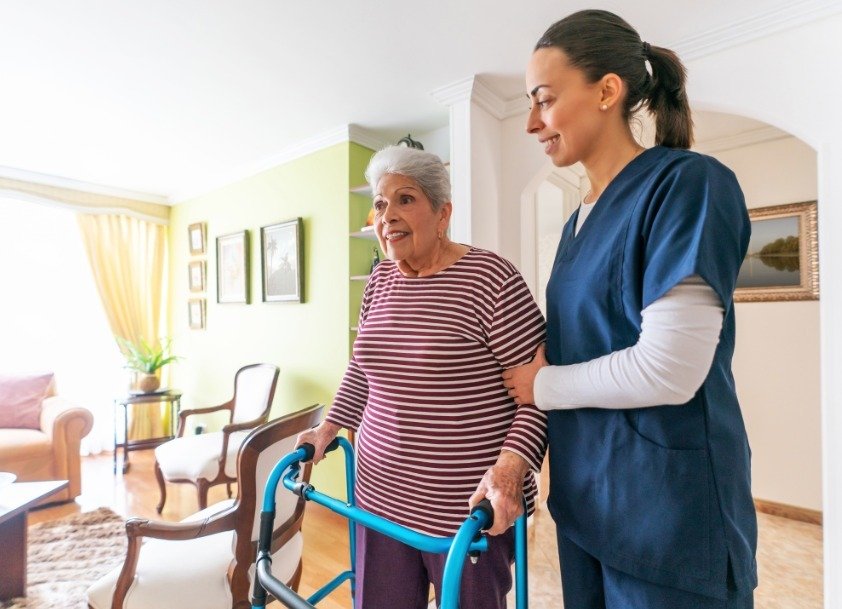The Growing Demand for In-Home Care
As America’s senior population grows, so does the demand for in-home healthcare services. Many older adults prefer to age in place, maintaining their independence while receiving care in the comfort of their own home. However, the cost of in-home care can be a significant financial challenge, leaving many seniors and their families struggling to afford essential services.
The median cost for a home health aide in the U.S. is over $5,000 per month, according to Genworth’s Cost of Care Survey. Medicare covers only limited in-home care services, leaving seniors to rely on personal savings, family support, or alternative financial solutions. This is where a reverse mortgage can be a game-changer, providing seniors with the funds they need to remain in their home longer while receiving quality care.
The median cost for a home health aide in the U.S. is over $5,000 per month, according to Genworth’s Cost of Care Survey. Medicare covers only limited in-home care services, leaving seniors to rely on personal savings, family support, or alternative financial solutions. This is where a reverse mortgage can be a game-changer, providing seniors with the funds they need to remain in their home longer while receiving quality care.
How a Reverse Mortgage Helps Fund In-Home Healthcare
A Home Equity Conversion Mortgage (HECM) allows homeowners aged 62 and older to tap into their home’s equity without selling their property or making monthly mortgage payments. For those needing in-home care, this provides several financial advantages:
1. Covering the Cost of Professional Care
Reverse mortgage proceeds can be used to pay for in-home caregivers, skilled nursing services, and even modifications to make the home safer for aging in place.
2. Eliminating Monthly Mortgage Payments
By replacing a traditional mortgage with a reverse mortgage, seniors can free up cash flow, making it easier to afford home healthcare services.
3. Providing a Steady Income Stream
Funds can be accessed as a lump sum, a monthly payment, or a line of credit—providing flexibility to cover ongoing or unexpected healthcare needs.
4. Reducing Financial Burden on Family Caregivers
Many adult children financially support aging parents’ in-home care. A reverse mortgage helps relieve financial stress on families, allowing loved ones to focus on care rather than costs.
Reverse mortgage proceeds can be used to pay for in-home caregivers, skilled nursing services, and even modifications to make the home safer for aging in place.
2. Eliminating Monthly Mortgage Payments
By replacing a traditional mortgage with a reverse mortgage, seniors can free up cash flow, making it easier to afford home healthcare services.
3. Providing a Steady Income Stream
Funds can be accessed as a lump sum, a monthly payment, or a line of credit—providing flexibility to cover ongoing or unexpected healthcare needs.
4. Reducing Financial Burden on Family Caregivers
Many adult children financially support aging parents’ in-home care. A reverse mortgage helps relieve financial stress on families, allowing loved ones to focus on care rather than costs.
Why Reverse Mortgages Support Aging in Place
Most seniors prefer to remain in their own home for as long as possible.
However, aging in place often requires adjustments, such as:
- Hiring home health aides for personal care and medical assistance.
- Modifying the home with ramps, stairlifts, or bathroom safety features.
- Covering transportation and meal services when seniors can no longer drive.
- Hiring home health aides for personal care and medical assistance.
- Modifying the home with ramps, stairlifts, or bathroom safety features.
- Covering transportation and meal services when seniors can no longer drive.
A reverse mortgage provides the financial freedom to make these necessary adjustments, ensuring seniors can maintain their independence without compromising on care.
For In-Home Healthcare Agencies: A Financial Solution for Clients
Home healthcare agencies often see seniors struggling to afford necessary
care, leading to delayed services or early facility placement. Educating
clients and their families about reverse mortgages as a funding option can
help them stay in their homes longer.
care, leading to delayed services or early facility placement. Educating
clients and their families about reverse mortgages as a funding option can
help them stay in their homes longer.
Benefits for Home Healthcare Providers
More clients can afford in-home care instead of delaying due to financial concerns.
Clients can receive care for longer durations, ensuring continuity and quality of service.
Less reliance on Medicaid or limited insurance coverage, expanding care options for seniors.
Clients can receive care for longer durations, ensuring continuity and quality of service.
Less reliance on Medicaid or limited insurance coverage, expanding care options for seniors.
Addressing Common Concerns About Reverse Mortgages
Many seniors and their families have misconceptions about reverse mortgages, often believing that the bank takes ownership of the home. In reality:
✅ Seniors retain ownership of their home and can live in it as long as they choose.
✅ Funds are tax-free and flexible, allowing for customized use.
✅ The loan is repaid when the home is sold—heirs can choose to keep the home by paying off the loan balance.
✅ It’s a non-recourse loan, meaning heirs will never owe more than the home’s value.
✅ Seniors retain ownership of their home and can live in it as long as they choose.
✅ Funds are tax-free and flexible, allowing for customized use.
✅ The loan is repaid when the home is sold—heirs can choose to keep the home by paying off the loan balance.
✅ It’s a non-recourse loan, meaning heirs will never owe more than the home’s value.
Empowering Seniors with Financial Security
For in-home healthcare agencies, understanding reverse mortgages can open new opportunities to help clients afford care. By partnering with reverse mortgage professionals, agencies can offer a viable financial solution that allows more seniors to stay in their homes, maintain their dignity, and receive the support they need.


